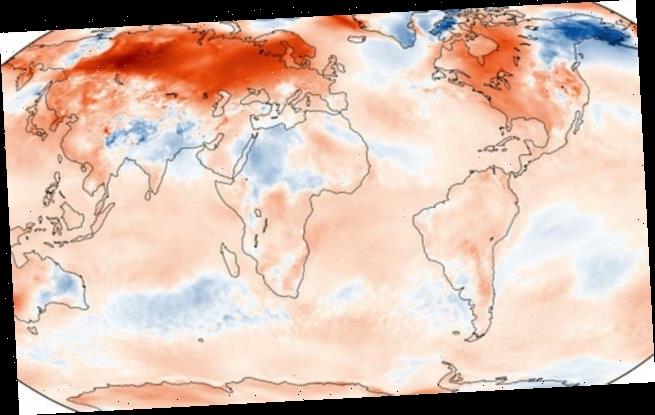Last month was the warmest January on record globally – with temperatures in Europe 0.4°F higher than the previous warmest January in 2007
- Global temperatures were 0.05°F (0.03°C) warmer than previous warmest
- European temperature was 0.4°F (0.2°C) hotter than previous record January
- Some parts of Europe were 10.8°F above the 1981-2010 January average
Last month was the warmest January ever recorded, according to data released by the European Union’s satellite monitoring service.
Global temperatures were 0.05°F (0.03°C) warmer than the previous warmest January in 2016, the Copernicus Climate Change Service revealed.
In Europe, the temperature increase was more pronounced, reaching 5.6°F (3.1°C) higher than the 19-year average between 1981 and 2010, and 0.4°F (0.2°C) warmer than the previous warmest January in 2007.
Average temperatures were especially high over large parts of north-eastern Europe – in some areas more than 10.8°F above the 1981-2010 January average, according to Copernicus.
Scroll down for video
Global temperatures were 0.05°F (0.03°C) warmer than the previous warmest January in 2016, the Copernicus Climate Change Service revealed. Some parts of north-eastern Europe were 10.8°F above the 1981-2010 January average (pictured)
The findings are based on computer-generated analyses using billions of measurements from satellites, ships, aircraft and weather stations around the world.
Temperatures were also much above average over most of the USA and eastern Canada, over Japan and parts of eastern China and Southeast Asia, over the state of New South Wales in Australia and over parts of Antarctica.
But temperatures were substantially below average over Alaska and north-western Canada, and over Baffin and Ellesmere Islands in north-eastern Canada.
Global means of the marine air temperature and underlying sea surface temperature were both close to the respective peak values that occurred at the time of the 2015/16 El Niño, which inflated the Earth’s average surface temperature by 0.12°C that year.
Copernicus revealed last month that 2019 was the second hottest record in recorded history.
‘2019 has been another exceptionally warm year, in fact the second warmest globally in our dataset, with many of the individual months breaking records,’ Carlo Buontempo, head of C3S, said at the time.
The latest revelation comes just a day after the Met Office revealed that last month was the sixth warmest January on record for the UK.
The average mean temperature across the UK was 42°F (5.6°C), according to provisional figures.
The warmest January on record was in 1916, when the mean temperature was 43.3°F (6.3°C).
Mild conditions meant the number of days of air frost last month was well below average.
In Europe, the temperature increase was more pronounced, reaching 5.6°F (3.1°C) higher than the 19-year average between 1981 and 2010, and 0.4°F (0.2°C) warmer than the previous warmest January in 2007.
The horizontal black line represents the mean surface air temperature for 1981-2010. The red lines represent the years where months exceeded the average for that time of year. The vertical black lines denote the January values
Air frost is defined by the Met Office as a day when the minimum temperature falls below freezing.
Only five days of widespread air frost were recorded in January 2020 – the lowest number since 1990.
In Morpeth, Northumberland, a 135-year January record was overturned when the local weather station did not observe a temperature of 32°F (0°C) or below during the entire month.
Met Office data on temperatures in the UK begins in 1884.
Figures for average rainfall in January 2020 show that Northern Ireland received only 59 per cent of its long-term average, while England and Wales received 86 per cent and 91 per cent respectively.
Only Scotland (119 per cent) received an above average amount.
The brightest parts of the country were along the east coast, with Leconfield in the East Riding of Yorkshire taking the prize for the sunniest place (145 per cent of average sunshine for January).
By contrast, both Stornoway and Tiree in the Hebrides recorded their dullest January on record, with just 42 per cent and 38 per cent of average sunshine respectively.
Source: Read Full Article



